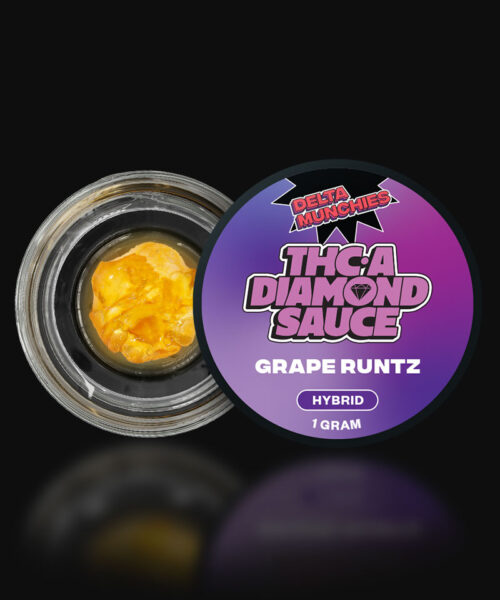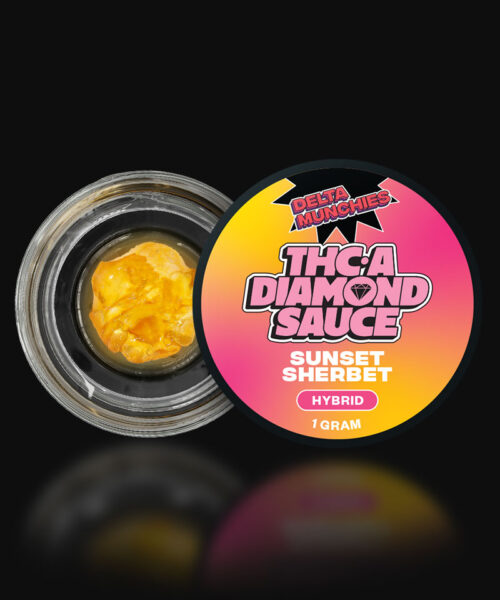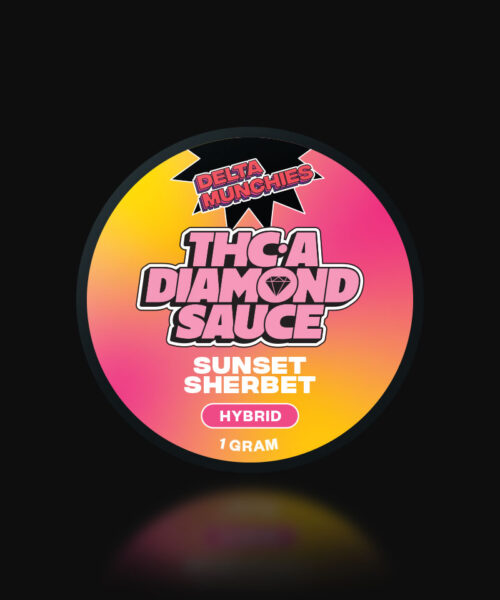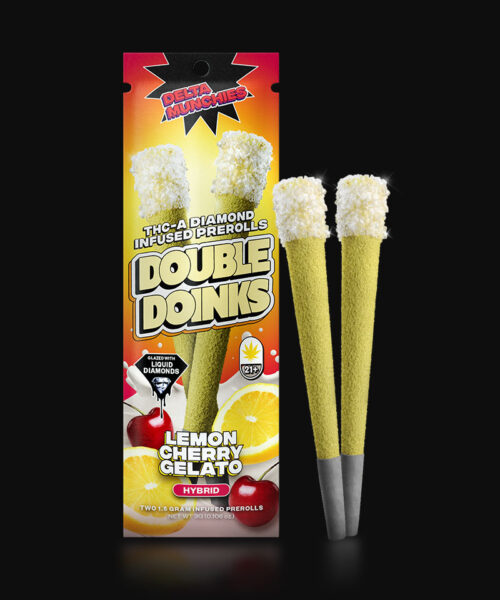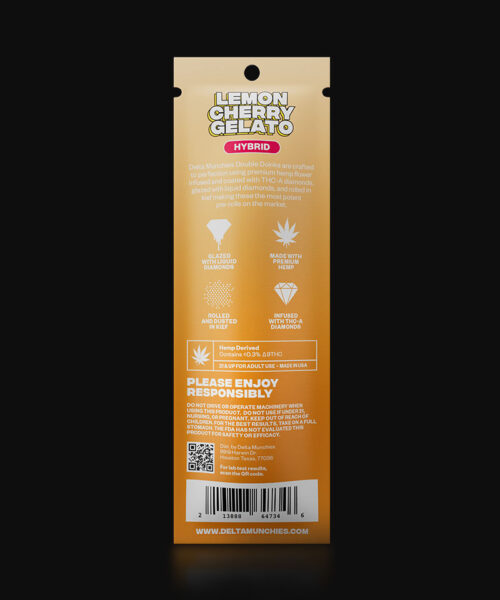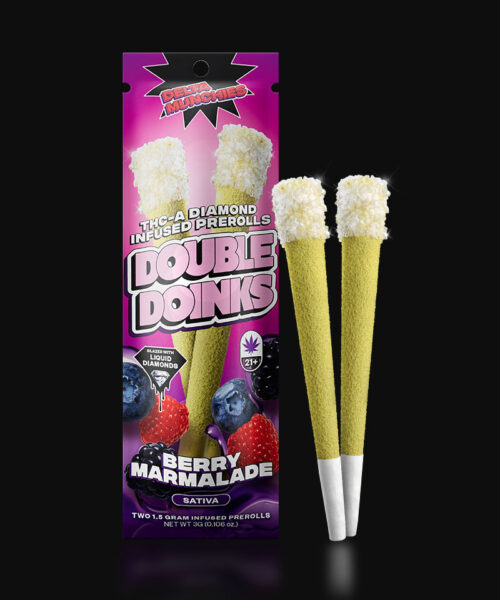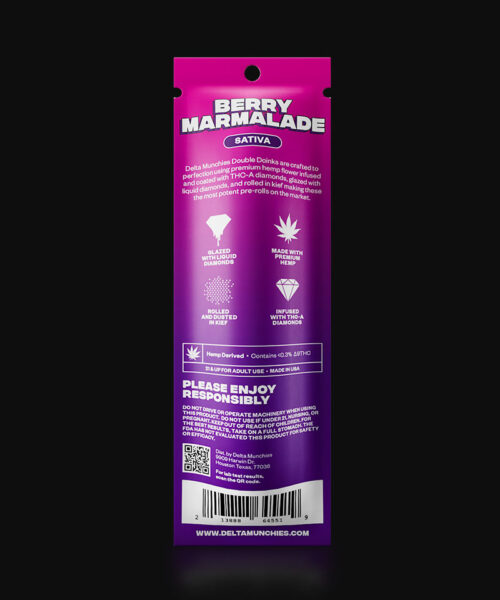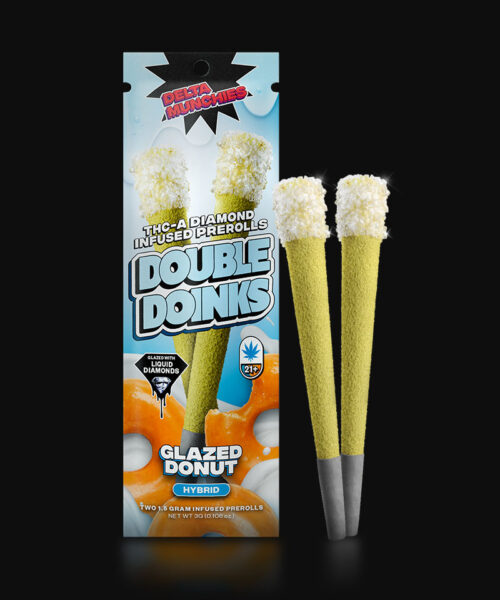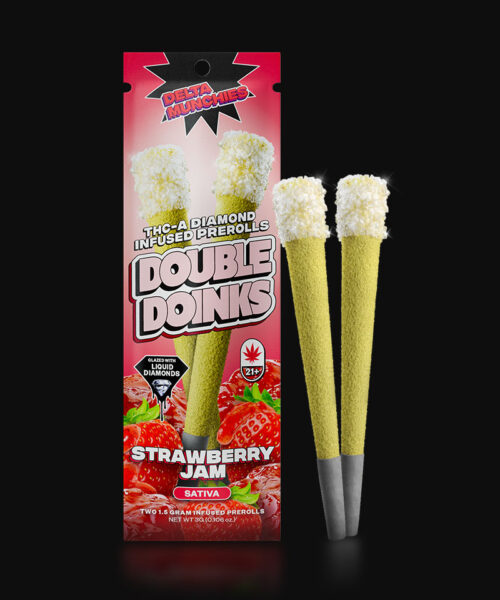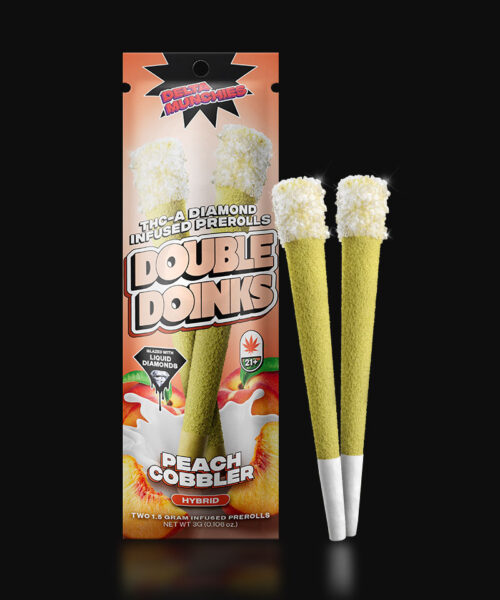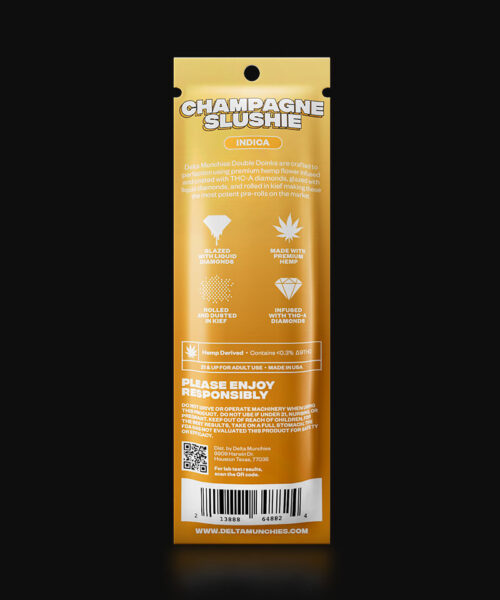Cannabis is a plant of many mysteries, and we will need more time to fully understand its workings. Many users have no doubt wondered why, for instance, eating raw cannabis does not make them high as opposed to smoking it.
The answer lies in two chemicals – tetrahydrocannabinolic acid (THCA) and tetrahydrocannabinol (THC). These two interact differently with receptors in the human body. Their preferential receptors are different, and so are their effects.
In this article, we explore the link between THCA and THC. We overview the process that converts the former into the latter. And, of course, we also talk about some of the potential effects and benefits of THCA.
Delta Munchies has got you covered with the best in class THCA products. Check ’em out!
Live Resin THC-A Dabs
$39.99
Live Resin THC-A Dabs
$39.99
THC-A Diamond Infused Prerolls
$29.99
Featured Products
$29.99
Key Takeaways
- THCA is a non-psychoactive cannabinoid acid from which THC is formed.
- The process of converting THCA into THC (decarboxylation) requires heat. Light and air are also thought to play a role in the conversion.
- The ideal temperature range for decarboxylating THCA into THC is 220-250 degrees Fahrenheit (104℃ and 121℃).
- Smoking is slightly over 33% efficient in converting THCA into THC.
What is THCA?
THCA is one of over 100 compounds naturally occurring in cannabis. It belongs to the THC cannabinoid family though it is not considered a classic cannabinoid like CBD, THC, and others. Instead, THCA is a cannabinoid acid, a ‘prototype’ cannabinoid of sorts.
It forms when cannabigerolic acid (CBGa)—the ‘mother of all cannabinoids’—converts into three intermediate precursor compounds, i.e., THCA, CBDa, and CBCa. These further lose a carboxyl (COOH) functional group via decarboxylation to form THC, CBD, and CBC, respectively.
THCA is non-psychoactive, meaning it does not induce a high. In other words, you cannot get intoxicated by eating raw cannabis material. It is also the most abundant compound in wild cannabis strains, which explains their typically high THC content.
Despite being non-psychoactive, THCA might have potential health benefits. Research suggests it may possess anti-inflammatory, anti-emetic, and neuroprotective properties. We discuss the possible applications of these properties later.
What is Delta 9 THC?
Are we not all familiar with good old delta 9 THC or simply THC? Well, for those still in the dark, delta 9 is the primary psychoactive compound in cannabis. When you smoke weed and get high, that is delta 9 doing its thing.
Together with CBD, delta 9 is the most studied cannabinoid. So, its pharmacological profile is pretty well understood. For instance, its high-inducing effect is due to its strong affinity for the CB1 receptor.
Besides its famous high, delta 9 also possesses health-benefiting qualities broadly utilized to reduce pain, enhance mood, boost appetite, and regulate inflammation, among others.
The 2018 Farm Bill legalized hemp-derived delta 9, meaning you can legally buy and use delta 9 hemp products without breaking the law. This is the best way of reaping the potential benefits of cannabinoids. Generally, these products are developed to address particular health problems. Moreover, they are typically safe, high-quality, and have minimal side effects.
Does THCA Turn into Delta 9 When Smoked?
Now on to the scientific stuff.
Remember we earlier referred to THCA as a ‘prototype’ cannabinoid? Well, this is because it is usually not the finished product. In raw form, THCA is unstable, and when exposed to heat, it loses the carboxyl group and forms delta 9 THC.
Generally, THCA starts to convert into THC when cannabis material is cured and dried. The conditions at which this is done are usually conducive to the conversion process. However, the temperatures are slightly low, so the process takes longer.
Because THCA and THC are organic compounds, they can easily get denatured by extreme temperatures. As a result, the optimal temperature for converting THCA into THC is between 104℃ and 121℃. THC starts degrading at temperatures between 250℃ and 350℃.
Incidentally, the temperature of a burning cigarette (coal center) is usually in the range of 700℃ to 900℃. Presuming the same applies to cannabis, how come THC is not destroyed? It is because the temperature distribution inside a joint or blunt varies. The heat reduces as it travels the length of the blunt, so not all the THC gets destroyed. But it certainly destroys a significant amount of valuable cannabinoids and terpenes.
How Does the Decarboxylation Process Affect THCA?
The decarboxylation process essentially converts THCA into its active form—THC. Heat (and light) aid the conversion by removing the carboxyl group, the reactive site of THCA.
The carboxyl functional group is unreactive to the CB1 receptor binding site. This is why THCA is non-psychoactive. On the other hand, THC has a hydroxyl (OH) functional group. Research shows at least three functional groups are involved in delta 9’s pharmacophore – C11, OH, and the side chain. Perhaps this is why THC binds powerfully to both the CB1 and CB2 receptors.
In effect, decarboxylation simply activates the bioactive substances in cannabis. However, it is noteworthy that THCA is still bioactive pre-carboxylation. Studies show it can interact with other receptors beyond the endocannabinoid system (ECS) hence its therapeutic effects.
What is the Ideal Temperature to Decarboxylate THCA into Delta 9?
The ideal temperature for ‘decarbing’ THCA into delta 9 varies with the method. You probably know there are several ways to decarb cannabis, the most common being smoking. However, the growing popularity of hemp products has fueled the emergence of novel methods like:
- Vaping
- Baking or cooking
- Dabbing
The newer methods are considered safer and healthier than smoking because they are smoke-free. Smoke contains toxic compounds, some of which are even thought to be carcinogenic.
Generally, the ideal temperature for converting THCA into THC ranges between 220-250° F (104-115° C) for roughly 30-60 minutes. Under these conditions, THCA converts into THC while also preserving the essential terpenes and other volatile cannabinoids.
What is the Efficiency of Converting THCA to Delta 9 THC When Smoked?
Smoking automatically converts THCA into THC, but other valuable compounds are lost due to the extreme temperatures. Also, with smoking, it is not easy to control the combustion temperature. In other words, smoking is not the most efficient way to convert THCA into delta 9.
That said, THCA generally requires lower temperatures to decarb compared to CBDa (230-290° F) and CBGa (230° F). A joint can reach temperatures of up to 900℃ at the core during combustion. This is obviously too high, so lots of THC is destroyed.
Ultimately, the conversion of THCA into THC is a function of time and heat. The higher the temperature, the shorter the conversion time. For example, while you need approximately 50 minutes to decarb THCA at 200° F, it takes only 7 minutes to achieve the same result at 265° F.
A paper in the Journal of Natural Products Chemistry and Research indicates that smokers inhale slightly over one-third of the cannabinoids in cannabis before burning. Interestingly, less than 0.5% of the originally present cannabinoids (THC and CBD) were recovered as carboxylic acids in the ash, sidestream smoke, and mainstream smoke. In other words, smoking almost completely decarboxylates cannabinoid acids but does not sufficiently preserve their chemical integrity.
Does Smoking THCA Cause a High?
In its natural form, THCA is non-psychoactive, so it does not produce a high. However, when smoked, it can make users high because it transforms into THC.
Is it even possible to smoke THCA? This seems like a misnomer because the moment you light up a blunt/joint, the THCA starts turning into THC. The whole point of smoking cannabis is to turn THCA into THC, whose health benefits are more wide-ranging.
Does Eating THCA Get You High?
Eating THCA does not get you high. Why? Because THCA is non-psychoactive, it neither binds to the CB1 receptor nor activates it.
However, there are still a host of benefits you can derive from eating THCA. Moreover, not everyone uses cannabis to get high. In fact, the growing popularity of cannabinoids like delta 8 and HHC owes to their less psychoactivity.
What are the Effects of a THCA High?
THCA does not induce a high, so it is not the go-to cannabinoid for users interested in getting stoned. But still, this cannabinoid acid exhibits potential health benefits that we discuss next.
What are the Potential Benefits of THCA?
We mentioned earlier that THCA has anti-inflammatory, neuroprotective, and anti-emetic properties. Research further shows that this cannabinoid may also possess anticonvulsant effects. These qualities present THCA as potentially therapeutically valuable in addressing the following:
- Nausea and vomiting — THCA is thought to be a stronger anti-emetic than THC and may help manage chemotherapy-induced nausea and vomiting.
- Epilepsy-related seizures — Preliminary preclinical investigations suggest that THCA might possess anticonvulsant activity.
- Neurodegenerative disorders — A 2017 study showed that THCA binds and activates the PPARγ receptors more strongly than decarboxylated cannabinoids. In mice, it improves motor deficits, prevents striatal degeneration, attenuates microgliosis and astrogliosis, and upregulates pro-inflammatory markers. These attributes make THCA a worthy consideration in treating neuroinflammatory and neurodegenerative illnesses.
- Inflammation — Several studies have highlighted the anti-inflammatory potential of THCA [1, 2, 3]. As such, it is touted as potentially valuable in treating inflammatory conditions.
Despite these promising findings, it is important to remember that research into THCA is young. More work is required to understand its full therapeutic and medicinal potential.
Is THCA Stronger Than Delta 9?
In terms of psychoactivity, THCA is not stronger than delta 9. In fact, it does not display any psychotomimetic effects. However, it displays particularly more potent anti-emetic qualities than delta 9.
Cannabinoids have different pharmacological profiles, which is why we encourage users to mix them. This activates the entourage effect and allows you to reap much more benefits than you typically get from a single cannabinoid.
What is Considered a High THCA Percentage?
Generally, cannabis strains with 15% or more THCA percentage pre-carboxylation are considered high THCA strains. Take note, however, that THCA content is not the same as THC content.
In most cases, the labels of hemp products indicate their THCA and THC contents, as both cannabinoids exist in raw cannabis. To know how much THC a product can produce post-decarboxylation, we apply the formula:
THC total = (%THCA) x 0.877 + (%THC)
So, a product with, say, 20% THCA and 0.3% THC content will have a total THC content of 17.84%. That is to say, (.877*20) + 0.3.
However, other variables like moisture content, surface area, and application method can affect decarboxylation. For example, an oven may not be as efficient as a slow cooker. So, this formula is only a guide for estimation purposes.
Where to Buy THCA Pre Rolls Online
The health benefits of cannabinoids are increasingly becoming apparent. Progressive laws like the 2018 Farm Bill and the growing acceptance of cannabis have been crucial in mainstreaming these compounds as potential value adders in health and wellness circles.
If you want to try THCA, your best bets are Delta Munchies THCA diamond infused rerolls. They come in six decadent flavors of Berry Marmalade, Peach Cobbler, Champagne Slushie, Glazed Donut, Strawberry Jam, and Lemon Cherry Gelato. These pre rolls are made with premium hemp, rolled and dusted in kief, and glazed with THCA liquid diamonds for a smooth and exhilarating hybrid smoking experience!
Final Thoughts
Despite the progress made in unearthing the potential benefits of cannabinoids, there is still so much to learn. Cannabis research, especially in the US, is young owing to legislation that previously outlawed the plant. Marijuana is still illegal in the country, bar for small pockets of areas where small amounts have been decriminalized.
That said, always exercise caution and due diligence when using hemp products. Cannabinoids are generally well-tolerated and have minimal side effects when used responsibly. Keep your doses low, especially when starting on a new product. It is also a good idea to consult healthcare professionals when supplementing with hemp products.
THCA: Frequently Asked Questions (FAQs)
What’s the Difference Between THCA and THC?
THCA is the intermediate precursor compound from which THC forms. It is non-psychoactive, whereas THC is psychoactive.
Is THCA the Same as Delta 9?
Of course not! THCA and delta 9 are not the same. Delta 9 is the decarboxylated form of THCA.
Which is Better, THCA or Delta 9?
Neither is better than the other. Both compounds have unique pharmacological properties, making them valuable agents for different therapeutic applications.
Is THCA Good?
So far, no scientific studies have demonstrated that THCA has adverse effects. Moreover, it is non-psychoactive, so it cannot induce intoxication when consumed raw.
Is THCA Federally Legal?
The 2018 Farm Bill legalized hemp with less than 0.3% THC content. So, yes, THCA is federally legal if derived from hemp.
Is THCA Addictive?
THCA in itself is not addictive because it does not stimulate the CB1 receptor—a trait seen in all substances with abuse potential.
Is THCA Safe?
Taken responsibly, THCA, like other cannabinoids, exhibits an exemplary safety profile.
Does THCA Test Positive for THC?
Yes, THCA can produce a positive drug test. That is because it contains small amounts of THC, whose metabolite tetrahydrocannabinol carboxylic acid (THC-COOH) is tested during drug tests.
The post Does THCA Turn into Delta 9 When Smoked? appeared first on Delta Munchies.


